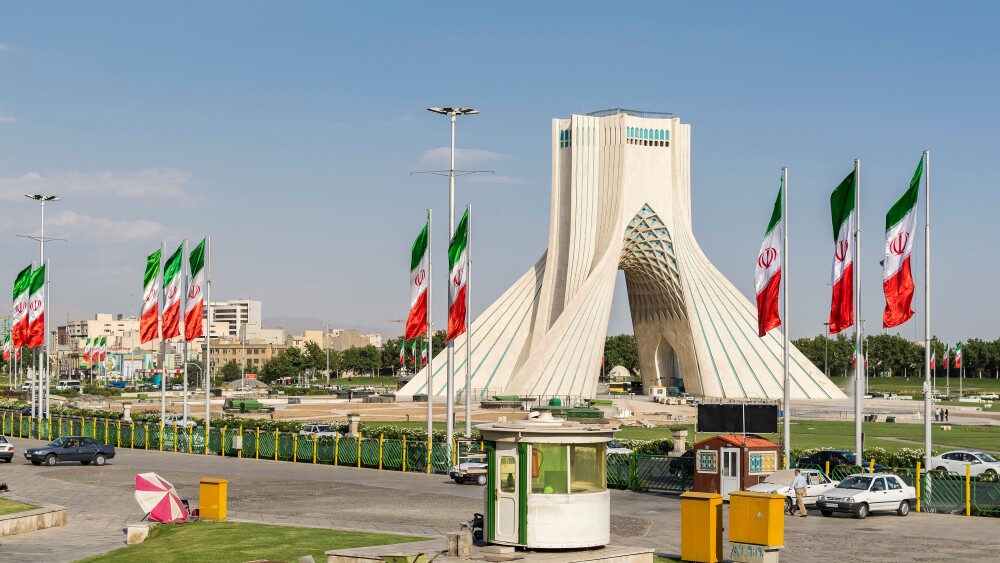In a political setback, the Islamic Republic canceled a much-touted free public traditional music concert this week—an event most factions of the regime had supported. The performance, scheduled for September 6 on the grounds of Tehran’s iconic Azadi Tower, was to feature Homayoun Shajarian, son of the late master vocalist Mohammad-Reza Shajarian. But, on September 3, amidst threats that the gathering would turn into an opposition rally, the government pulled the plug.
Many Iranians recognized the concert as a clumsy, “skin-shedding” move by a beleaguered regime. In the wake of Israel’s June 2025 air campaign and amidst economic and social crises, the authorities had staged a series of August photo-ops—promoting influencers, showcasing public leisure, and signaling tolerance—to project solidarity and normalcy. The Shajarian concert was to be the centerpiece of this makeover.
Many Iranians recognized the concert as a clumsy, “skin-shedding” move by a beleaguered regime.
The most vocal critics came from the diaspora, particularly pro-monarchy activists. Social media campaigns urged people to attend the concert and seize the chance to chant anti-regime slogans, turning it into a mass rally against the government. Some even likened the moment to Nicolae Ceaușescu’s final speech in December 1989, when a carefully staged rally in Bucharest suddenly turned to open rebellion, and the dictator’s bewildered reaction became a symbol of collapse.
Hints of a softer line had appeared in recent weeks: Officials eased hijab enforcement, allowed women to ride motorcycles, and tolerated public dancing or impromptu performances in malls and streets—acts that only months earlier would have drawn crackdowns. Opposition figures dismissed these gestures as little more than another attempt by the theocracy to feign normalcy.
Support for the Shajarian concert spanned the regime’s spectrum. Reformists championed it, but even hardline outlets later condemned its cancelation, blaming “rejectionist” opposition activists. Such rare acknowledgment of opposition influence—especially of exiled groups—would have been unthinkable a year ago.
“From the organized campaigns of opposition groups … it is clear that opponents seek to undermine even the smallest social occasions that might bring a moment of joy and hope, by turning them into political or security issues,” the daily Khorasan complained in an editorial.
Opponents counter that most Iranians are mired in poverty, shortages of water and electricity, and collapsing living standards—the direct result of the Islamic Republic’s rule. A free concert, they argue, is a cynical attempt to mask these hardships. Without pressure from sanctions, unrest, and military defeat, officials would never attempt such gestures of renewal.
Some dubbed this brief “liberalization” the “Netanyahu factor,” pointing to the regime’s fear after Israel’s June strikes and its threat of further attacks. The precision air campaign demolished high-value military and nuclear sites and stripped away the Islamic Revolutionary Guard Corps’ long-cultivated image of invincibility.
Without pressure from sanctions, unrest, and military defeat, officials would never attempt such gestures of renewal.
As one Iranian tweeted, “Reformists failed to secure a large public concert for two decades. But in just 12 days of jet engines roaring, Israel managed to secure a permit for Homayoun Shajarian’s concert. Even this 12-day civic outcome surpasses all the reforms of the past 16 years.”
The anxiety around Israeli actions may not be misplaced. In early September, a delegation of Iranian opposition figures representing former Crown Prince Reza Pahlavi visited Israel, where they received a warm welcome and met President Isaac Herzog. The initiative, dubbed the “Cyrus Accords,” was presented as a symbol of friendship between the two peoples—and, for monarchist activists, amounted to Israel’s de facto recognition of Pahlavi as the leading opposition figure.
The cancelation of the Shajarian concert is, therefore, more than a symbolic defeat. Even Tehran media and some insiders see it as a sign of fragility. Former lawmaker Mahmoud Sadeghi posted on X, “If you canceled it out of fear of a few slogans being shouted, the negative impact is far greater. Beyond the bitterness now etched in public memory, it also revealed to people that decision-makers themselves see security as fragile.” He is not wrong.






